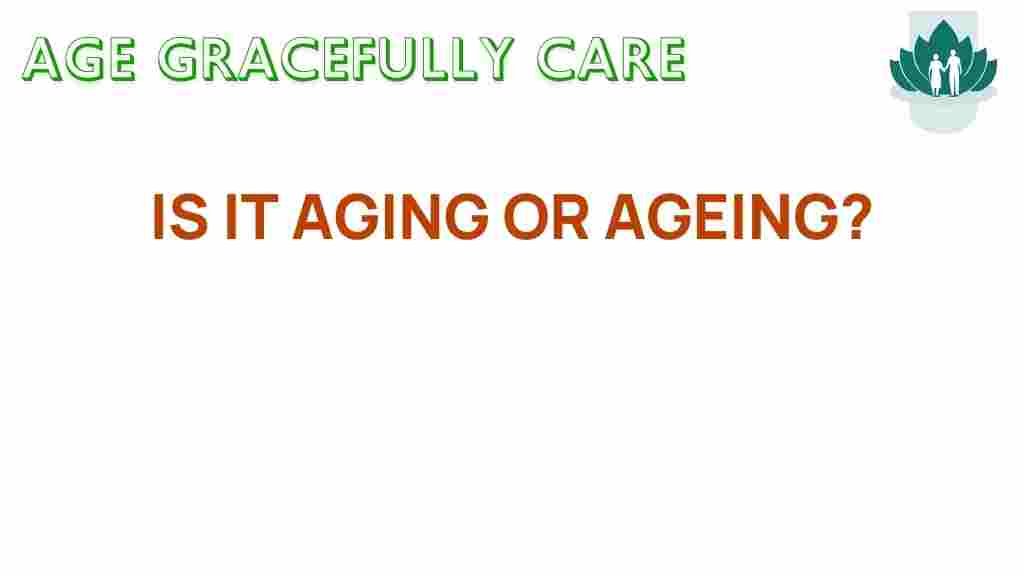Aging or Ageing: The Subtle Differences That Matter
The terms “aging” and “ageing” have been a topic of discussion for many, especially in the context of health, wellness, and longevity. While they refer to the same process of growing older, the choice of spelling often reflects cultural or regional differences. In this article, we will explore these subtle differences and delve into the broader implications of aging, including its impact on vitality, cognitive decline, and overall health. Understanding these concepts is crucial for enhancing our lifestyle choices and promoting a healthier, more fulfilling life.
Understanding Aging and Ageing
Aging (or ageing) is a natural biological process that occurs in all living organisms. It involves a gradual decline in physical and mental capabilities, which can lead to various health issues. The choice of spelling often depends on geographical location: “aging” is commonly used in American English, while “ageing” is the preferred spelling in British English. Regardless of the spelling, the implications of aging are significant and warrant a deeper exploration.
The Importance of Health and Wellness in Aging
As we age, maintaining our health and wellness becomes increasingly important. Here are some key points to consider:
- Physical Health: Regular exercise and a balanced diet are essential for combating the adverse effects of aging. They help maintain muscle mass, bone density, and cardiovascular health.
- Mental Health: Cognitive decline is a common concern as we age. Engaging in mentally stimulating activities, such as puzzles, reading, and learning new skills, can help keep our minds sharp.
- Social Connections: Maintaining social relationships can significantly enhance our emotional well-being and longevity. Loneliness can exacerbate health issues, making social engagement vital.
Longevity and Aging
Longevity refers to the length of time that a person lives. Numerous studies have shown that lifestyle choices play a critical role in determining longevity. Factors that contribute to a longer life include:
- Nutrition: A diet rich in fruits, vegetables, whole grains, and lean proteins can promote longevity.
- Exercise: Regular physical activity helps maintain a healthy weight, boosts mood, and reduces the risk of chronic diseases.
- Stress Management: Techniques such as mindfulness, meditation, and yoga can help manage stress, which affects overall health.
Gerontology: The Study of Aging
Gerontology is the multidisciplinary study of aging and the challenges that come with it. This field encompasses various areas, including biology, psychology, sociology, and public health. Understanding gerontology is crucial for developing effective strategies to enhance the quality of life for older adults.
Step-by-Step Process for Healthy Aging
To promote healthy aging, consider the following steps:
- Assess Your Current Health: Regular check-ups with your healthcare provider can help identify any health issues early on.
- Adopt a Balanced Diet: Focus on whole foods and minimize processed foods. Consider the Mediterranean diet, which is rich in healthy fats, lean proteins, and plenty of fruits and vegetables.
- Stay Active: Aim for at least 150 minutes of moderate aerobic activity each week, along with strength training exercises.
- Engage Socially: Join clubs, volunteer, or participate in community events to foster social connections.
- Prioritize Mental Health: Regularly practice mindfulness or meditation to enhance cognitive function and reduce stress.
Troubleshooting Tips for Common Aging Concerns
Aging can bring about various challenges, but here are some troubleshooting tips to address common concerns:
- Cognitive Decline: If you notice memory lapses, try using memory aids like calendars and reminders. Engaging in brain-training games can also help.
- Physical Limitations: If you experience joint pain or reduced mobility, consult a physical therapist for tailored exercises.
- Emotional Well-being: Feelings of loneliness or depression should not be ignored. Seek professional help if needed and maintain connections with family and friends.
Maintaining Vitality in Later Years
Vitality refers to the state of being strong and active. To maintain vitality as you age, consider the following strategies:
- Stay Hydrated: Proper hydration is essential for overall health, especially as we age.
- Get Enough Sleep: Aim for 7-9 hours of quality sleep each night to support cognitive function and physical health.
- Limit Alcohol and Tobacco: Reducing or eliminating these substances can have a positive impact on your overall health and longevity.
The Role of Technology in Aging
Technology plays an increasingly important role in how we manage aging. From health monitoring devices to online communities, technology can enhance the aging experience:
- Wearable Health Devices: These can help track physical activity, heart rate, and sleep patterns, providing valuable insights into your health.
- Telehealth Services: Access to healthcare professionals through telehealth can facilitate regular check-ups and consultations without the need for travel.
- Online Support Groups: Engaging with others who share similar experiences can provide emotional support and decrease feelings of isolation.
Conclusion: Embracing the Aging Journey
Aging or ageing, regardless of how it’s spelled, is a universal experience that can be navigated with grace and vitality. By focusing on health, wellness, and lifestyle choices, we can mitigate the effects of aging and promote longevity. Understanding the fields of gerontology and the importance of social engagement can further enhance our experience as we age. Remember, the journey of aging is not just about the passage of time but about how we choose to live each moment.
For more information on healthy aging practices, check out this comprehensive guide on wellness. If you’d like to connect with others who are also navigating the aging journey, consider joining local or online communities where you can share experiences and tips.
This article is in the category Wellness and created by AgeGracefullyCare Team
